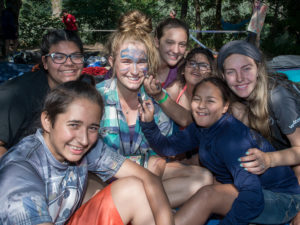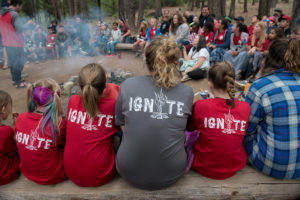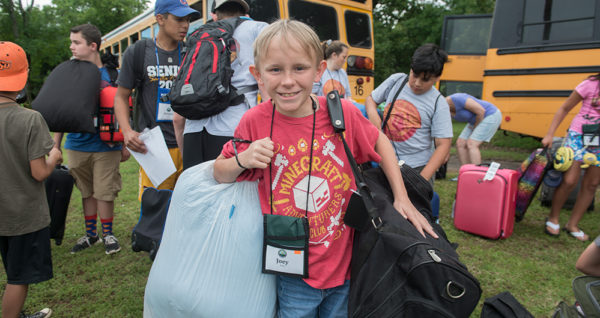This summer, Sanctuary will be leading Camp HOPE America: New York. Learn how this trauma-informed camp is helping young victims of domestic violence heal and find hope again.
Bria Diemer is a Communications Intern at Sanctuary and a rising Junior at Pace University where she studies film and creative writing.
—
Summer camp is something we do as children because it seems fun and exciting – and because our parents want us out of the house. We swim in open waters and over-eat junk food and gossip about nothing with strangers who somehow already feel like life-long friends. Summer camp is something we need as children because it is a place to meet people and hear stories and have fun in a way only kids can. At home, there’s homework and chores and other impending childhood responsibilities. But at camp, there’s nothing to do but scream and laugh and be yourself. It’s an easy escape from the real world, from home, wherever that may be.
But for many kids, home is something to escape from. According to estimates, between 2 and 10 million children will be exposed to domestic violence each year in America. This trauma makes children more susceptible to short- and long-term emotional, social and behavioral difficulties such as increased anxiety, depression, isolation, physical and psychological aggression and a predisposition to continue the cycle of abuse. Ages 12-17 are some of the most formative years for human development, and the presence of trauma can prevent healthy, effective growth. Trauma forces children to bypass their childhood entirely, leaving no time for s’mores and rock climbing.
Camp HOPE
 Every day, Sanctuary for Families works with families that have experienced violence and abuse. And while we and other service providers offer services for the entire family, adolescent kids are often an underserved group. This summer, Sanctuary is partnering with Camp HOPE America to establish Camp HOPE America: New York, which will run from August 20-24. Thirty children ages 12 to 17, (15 girls and 15 boys) will participate in a week-long camp in upstate New York. Sanctuary was asked to pilot the first Camp HOPE America affiliate serving children in the New York City metropolitan area. Over the course of the week campers will enjoy classic camp activities such as swimming, high ropes courses, nightly campfires, team building activities, a trip to a planetarium, zip lining, canoeing, art, and a talent show. And thanks to Sanctuary’s partnership with the Fresh Air Fund, the camp will take place on 2,000 acres of land including two beautiful lakes, mountain overlooks and forested trails in Fishkill, New York.
Every day, Sanctuary for Families works with families that have experienced violence and abuse. And while we and other service providers offer services for the entire family, adolescent kids are often an underserved group. This summer, Sanctuary is partnering with Camp HOPE America to establish Camp HOPE America: New York, which will run from August 20-24. Thirty children ages 12 to 17, (15 girls and 15 boys) will participate in a week-long camp in upstate New York. Sanctuary was asked to pilot the first Camp HOPE America affiliate serving children in the New York City metropolitan area. Over the course of the week campers will enjoy classic camp activities such as swimming, high ropes courses, nightly campfires, team building activities, a trip to a planetarium, zip lining, canoeing, art, and a talent show. And thanks to Sanctuary’s partnership with the Fresh Air Fund, the camp will take place on 2,000 acres of land including two beautiful lakes, mountain overlooks and forested trails in Fishkill, New York.
Camp HOPE America is the first camping and mentoring initiative focused on children exposed to domestic violence. Initially beginning in California, Camp HOPE has developed into a nationwide effort spanning over five states. This year, an estimated 1,500 children and young adults will benefit from all that Camp HOPE America has to offer.
 Counselors at the camp have been trained to use a trauma-informed approach when working with the children. Trauma-informed care means understanding a person entirely, and taking their traumas and resulting coping mechanisms into consideration when attempting to understand certain behaviors. “We want to know what happened before this, what were the factors that led up to this? It’s important to understand the root of the issue before addressing the actual issue,” says Bridget Shanahan, co-director of the New York camp. A person’s exposure to trauma influences each area of human development— physical, mental, behavioral, social, spiritual —which is why a trauma-informed method most effectively promotes healing, growth and overall hope.
Counselors at the camp have been trained to use a trauma-informed approach when working with the children. Trauma-informed care means understanding a person entirely, and taking their traumas and resulting coping mechanisms into consideration when attempting to understand certain behaviors. “We want to know what happened before this, what were the factors that led up to this? It’s important to understand the root of the issue before addressing the actual issue,” says Bridget Shanahan, co-director of the New York camp. A person’s exposure to trauma influences each area of human development— physical, mental, behavioral, social, spiritual —which is why a trauma-informed method most effectively promotes healing, growth and overall hope.
Hope is the belief that your future will be better than your past and that you have the power to achieve your dreams. While “hope” sounds like an uncomplicated, commonplace emotion, it actually proves to be an effective source of motivation, specifically for young adults. Hope can inspire roadmaps to short- and long-term goals as well as the inspiration to overcome obstacles that arise. “This camp focuses on hope rather than resiliency because hope is something you can build. Everyone can still have hope,” Shanahan explains. Each camper is given a questionnaire before, during and after the camp in effort to gauge a hope index. These ‘Hope Scores’ are an evidenced-based measure of hope, and results show that post-camp Hope Scores are increased and are sustained over time.
Support
Childhood is a precious time that should be full of the fun and excitement, not violence and trauma. If you would like to support Sanctuary for Families’ first Camp HOPE and our youngest clients, please click here.
